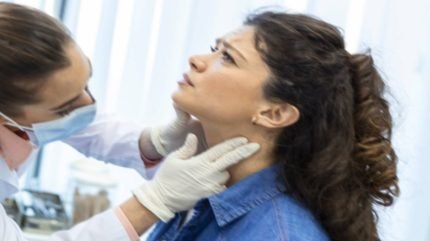
Rakuten Medical has dosed the first patient in its intercontinental Phase III trial into its photoimmunotherapy, ASP-1929, in patients with recurrent head and neck squamous cell carcinoma (HNSCC).
The multi-centre, randomised, open-label trial will examine the company’s antibody-dye conjugate comprised of the antibody drug, cetuximab in combination with MSD’s flagship monoclonal antibody Keytruda (pembrolizumab). Now, the San Diego-based company is looking to launch enrolment for the trial across Japan and Taiwan.

Discover B2B Marketing That Performs
Combine business intelligence and editorial excellence to reach engaged professionals across 36 leading media platforms.
The ASP-1929-381 trial (NCT06699212) will examine locoregional recurrent HNSCC without distant metastases. The intended 400 patients will be randomised to receive either ASP-1929 photoimmunotherapy in combination with Keytruda, or a control arm receiving the current Keytruda-based standard of care. In that case, they might be given Keytruda alone or in combination with chemotherapy.
The primary endpoint is overall survival (OS), with key secondary endpoints including complete response rate (CRR) and overall response rate (ORR).
The Phase III study is set to build on the results of the company’s interim analysis from its Phase Ib/II trial (NCT04305795) which saw an estimated 24-month survival rate of 52.4% at 24 months, and an ORR of 35.3%. The median overall survival rate was not yet reached when data was published.
Mickey Mikitani, chief executive at Rakuten Medical, said: “The initiation of this global Phase III trial marks a significant milestone in our journey to contribute to the treatment and lives of patients with head and neck cancer and potentially others affected by cancer.

US Tariffs are shifting - will you react or anticipate?
Don’t let policy changes catch you off guard. Stay proactive with real-time data and expert analysis.
By GlobalData“With encouraging data from Phase Ib/II study, we are optimistic about the potential of ASP-1929 photoimmunotherapy combined with Keytruda to improve treatment outcomes in recurrent head and neck cancer.”
HNSCC is a form of cancer that can start in the squamous cells that line the mucosal surfaces of a patient’s head or neck, such as those in the mouth or throat, becoming cancerous. Research published by the US National Institute of Health (NIH) in 2023 found that HNSCC was the 7th most common form of cancer, stemming in part from active smokers.
William Chad Spanos, principal investigator for the ASP-1929-381 study, added: “I am impressed by the technology behind photoimmunotherapy, which offers a novel and targeted approach to cancer treatment.
“Combining this with Keytruda has the potential to expand first-line treatment options for patients with recurrent HNSCC. I am pleased to initiate this groundbreaking trial at our site and look forward to contributing to advancing care for patients facing this challenging disease.”
Elsewhere in the world of HNSCC, American multinational MSD has reported that its Phase III KEYNOTE-689 trial of Keytruda has met its primary endpoints. Meanwhile, Flamingo Therapeutics has dosed the first patients in the UK and South Korea as part of its ongoing Phase II PEMDA-HN trial.





